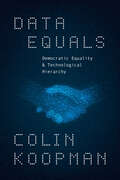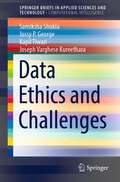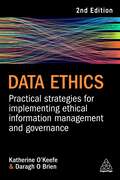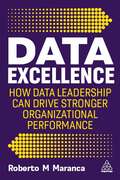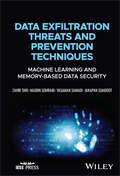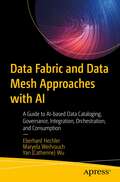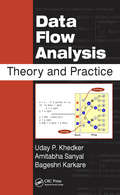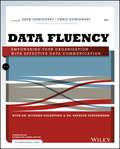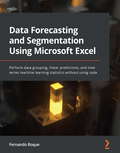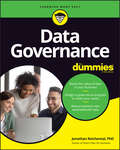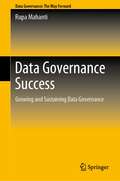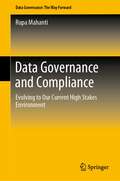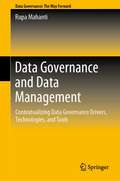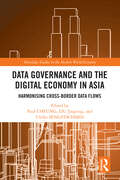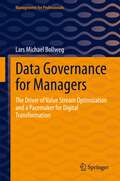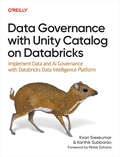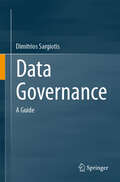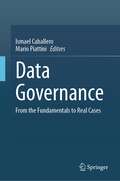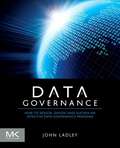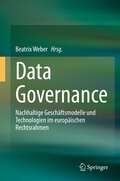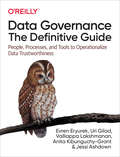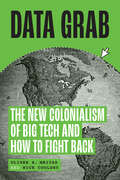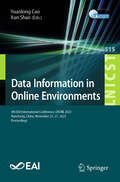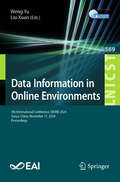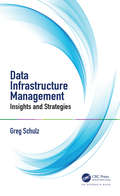- Table View
- List View
Data Equals: Democratic Equality and Technological Hierarchy
by Colin KoopmanAn expansive vision for data equality that goes beyond algorithmic fairness. When we gave algorithms power over our world, we hoped that the apparent neutrality of machine thinking would create a more egalitarian age. Yet we are more divided than ever, staring down threats to democracy itself. In Data Equals, Colin Koopman argues that data technologies fail us so often because we built them around a deficient notion of equality. It is not enough, Koopman explains, that algorithms engage everyone’s data with the same measuring stick. The data themselves are all too often structured in ways that obscure and exacerbate stratifying distinctions. Koopman contends that we must also work to ensure that those people subject to computational assessment enter data systems on equal terms. Part philosophical argument, part practical guide (replete with case studies from education technology), Data Equals offers novel methods for realizing democratic equality in a digital age.
Data Ethics and Challenges (SpringerBriefs in Applied Sciences and Technology)
by Samiksha Shukla Joseph Varghese Kureethara Jossy P. George Kapil TiwariThis book gives a thorough and systematic introduction to Data, Data Sources, Dimensions of Data, Privacy, and Security Challenges associated with Data, Ethics, Laws, IPR Copyright, and Technology Law. This book will help students, scholars, and practitioners to understand the challenges while dealing with data and its ethical and legal aspects. The book focuses on emerging issues while working with the Data.
Data Ethics: Practical Strategies for Implementing Ethical Information Management and Governance
by Katherine O'Keefe Daragh O BrienData-gathering technology is more sophisticated than ever, as are the ethical standards for using this data. This second edition shows how to navigate this complex environment.Data Ethics provides a practical framework for the implementation of ethical principles into information management systems. It shows how to assess the types of ethical dilemmas organizations might face as they become more data-driven. This fully updated edition includes guidance on sustainability and environmental management and on how ethical frameworks can be standardized across cultures that have conflicting values. There is also discussion of data colonialism, the challenge of ethical trade-offs with ad-tech and analytics such as Covid-19 tracking systems and case studies on Smart Cities and Demings Principles.As the pace of developments in data-processing technology continues to increase, it is vital to capitalize on the opportunities this affords while ensuring that ethical standards and ideals are not compromised. Written by internationally regarded experts in the field, Data Ethics is the essential guide for students and practitioners to optimizing ethical data standards in organizations.
Data Excellence: How Data Leadership Can Drive Stronger Organizational Performance
by Roberto M MarancaHow can data leaders build long-term value in the era of AI? Data Excellence by Roberto Maranca is the strategic guide for Chief Data Officers, VPs, Directors and consultants responsible for delivering sustained, measurable data performance. Combining tactical insight with long-term vision, this book shows how to embed data leadership across the enterprise and drive real organizational value, beyond just tools or tech.Framing the data leader as a performance coach, it offers a clear methodology for building scalable data capabilities that align with AI-driven transformation, governance and business goals. You'll learn how to: - Build a culture of data performance through behavior and mindset shifts - Strengthen change execution and align initiatives across business units - Deliver measurable value through data productization and cost-benefit analysis - Evaluate risk and control functions across the data lifecycle - Apply performance diagnostics including use-case readiness and initiative mapping With practical tools and strategic depth, Data Excellence equips senior data leaders to future-proof their organizations and lead with impact in an increasingly AI-powered landscape.Themes include: data leadership, organizational performance, AI-era transformation, data culture, value generation, data governance
Data Exfiltration Threats and Prevention Techniques: Machine Learning and Memory-Based Data Security
by Zahir Tari Nasrin Sohrabi Yasaman Samadi Jakapan SuabootDATA EXFILTRATION THREATS AND PREVENTION TECHNIQUES Comprehensive resource covering threat prevention techniques for data exfiltration and applying machine learning applications to aid in identification and prevention Data Exfiltration Threats and Prevention Techniques provides readers the knowledge needed to prevent and protect from malware attacks by introducing existing and recently developed methods in malware protection using AI, memory forensic, and pattern matching, presenting various data exfiltration attack vectors and advanced memory-based data leakage detection, and discussing ways in which machine learning methods have a positive impact on malware detection. Providing detailed descriptions of the recent advances in data exfiltration detection methods and technologies, the authors also discuss details of data breach countermeasures and attack scenarios to show how the reader may identify a potential cyber attack in the real world. Composed of eight chapters, this book presents a better understanding of the core issues related to the cyber-attacks as well as the recent methods that have been developed in the field. In Data Exfiltration Threats and Prevention Techniques, readers can expect to find detailed information on: Sensitive data classification, covering text pre-processing, supervised text classification, automated text clustering, and other sensitive text detection approaches Supervised machine learning technologies for intrusion detection systems, covering taxonomy and benchmarking of supervised machine learning techniques Behavior-based malware detection using API-call sequences, covering API-call extraction techniques and detecting data stealing behavior based on API-call sequences Memory-based sensitive data monitoring for real-time data exfiltration detection and advanced time delay data exfiltration attack and detection Aimed at professionals and students alike, Data Exfiltration Threats and Prevention Techniques highlights a range of machine learning methods that can be used to detect potential data theft and identifies research gaps and the potential to make change in the future as technology continues to grow.
Data Fabric and Data Mesh Approaches with AI: A Guide to AI-based Data Cataloging, Governance, Integration, Orchestration, and Consumption
by Eberhard Hechler Maryela Weihrauch Yan (Catherine) WuUnderstand modern data fabric and data mesh concepts using AI-based self-service data discovery and delivery capabilities, a range of intelligent data integration styles, and automated unified data governance—all designed to deliver "data as a product" within hybrid cloud landscapes.This book teaches you how to successfully deploy state-of-the-art data mesh solutions and gain a comprehensive overview on how a data fabric architecture uses artificial intelligence (AI) and machine learning (ML) for automated metadata management and self-service data discovery and consumption. You will learn how data fabric and data mesh relate to other concepts such as data DataOps, MLOps, AIDevOps, and more. Many examples are included to demonstrate how to modernize the consumption of data to enable a shopping-for-data (data as a product) experience.By the end of this book, you will understand the data fabric concept and architecture as it relates to themes such as automated unified data governance and compliance, enterprise information architecture, AI and hybrid cloud landscapes, and intelligent cataloging and metadata management. What You Will LearnDiscover best practices and methods to successfully implement a data fabric architecture and data mesh solutionUnderstand key data fabric capabilities, e.g., self-service data discovery, intelligent data integration techniques, intelligent cataloging and metadata management, and trustworthy AIRecognize the importance of data fabric to accelerate digital transformation and democratize data accessDive into important data fabric topics, addressing current data fabric challengesConceive data fabric and data mesh concepts holistically within an enterprise contextBecome acquainted with the business benefits of data fabric and data mesh Who This Book Is ForAnyone who is interested in deploying modern data fabric architectures and data mesh solutions within an enterprise, including IT and business leaders, data governance and data office professionals, data stewards and engineers, data scientists, and information and data architects. Readers should have a basic understanding of enterprise information architecture.
Data Flow Analysis: Theory and Practice
by Uday Khedker Amitabha Sanyal Bageshri SatheData flow analysis is used to discover information for a wide variety of useful applications, ranging from compiler optimizations to software engineering and verification. Modern compilers apply it to produce performance-maximizing code, and software engineers use it to re-engineer or reverse engineer programs and verify the integrity of their programs. Supplementary Online Materials to Strengthen Understanding Unlike most comparable books, many of which are limited to bit vector frameworks and classical constant propagation, Data Flow Analysis: Theory and Practice offers comprehensive coverage of both classical and contemporary data flow analysis. It prepares foundations useful for both researchers and students in the field by standardizing and unifying various existing research, concepts, and notations. It also presents mathematical foundations of data flow analysis and includes study of data flow analysis implantation through use of the GNU Compiler Collection (GCC). Divided into three parts, this unique text combines discussions of inter- and intraprocedural analysis and then describes implementation of a generic data flow analyzer (gdfa) for bit vector frameworks in GCC. Through the inclusion of case studies and examples to reinforce material, this text equips readers with a combination of mutually supportive theory and practice, and they will be able to access the author’s accompanying Web page. Here they can experiment with the analyses described in the book, and can make use of updated features, including: Slides used in the authors’ courses The source of the generic data flow analyzer (gdfa) An errata that features errors as they are discovered Additional updated relevant material discovered in the course of research
Data Fluency
by Richard Galentino Zach Gemignani Patrick Schuermann Chris GemignaniA dream come true for those looking to improve their data fluencyAnalytical data is a powerful tool for growing companies, but what good is it if it hides in the shadows? Bring your data to the forefront with effective visualization and communication approaches, and let Data Fluency: Empowering Your Organization with Effective Communication show you the best tools and strategies for getting the job done right. Learn the best practices of data presentation and the ways that reporting and dashboards can help organizations effectively gauge performance, identify areas for improvement, and communicate results.Topics covered in the book include data reporting and communication, audience and user needs, data presentation tools, layout and styling, and common design failures. Those responsible for analytics, reporting, or BI implementation will find a refreshing take on data and visualization in this resource, as will report, data visualization, and dashboard designers.Conquer the challenge of making valuable data approachable and easy to understandDevelop unique skills required to shape data to the needs of different audiencesFull color book links to bonus content at juiceanalytics.comWritten by well-known and highly esteemed authors in the data presentation communityData Fluency: Empowering Your Organization with Effective Communication focuses on user experience, making reports approachable, and presenting data in a compelling, inspiring way. The book helps to dissolve the disconnect between your data and those who might use it and can help make an impact on the people who are most affected by data. Use Data Fluency today to develop the skills necessary to turn data into effective displays for decision-making.
Data Forecasting and Segmentation Using Microsoft Excel: Perform data grouping, linear predictions, and time series machine learning statistics without using code
by Fernando RoquePerform time series forecasts, linear prediction, and data segmentation with no-code Excel machine learningKey FeaturesSegment data, regression predictions, and time series forecasts without writing any codeGroup multiple variables with K-means using Excel plugin without programmingBuild, validate, and predict with a multiple linear regression model and time series forecastsBook DescriptionData Forecasting and Segmentation Using Microsoft Excel guides you through basic statistics to test whether your data can be used to perform regression predictions and time series forecasts. The exercises covered in this book use real-life data from Kaggle, such as demand for seasonal air tickets and credit card fraud detection.You'll learn how to apply the grouping K-means algorithm, which helps you find segments of your data that are impossible to see with other analyses, such as business intelligence (BI) and pivot analysis. By analyzing groups returned by K-means, you'll be able to detect outliers that could indicate possible fraud or a bad function in network packets.By the end of this Microsoft Excel book, you'll be able to use the classification algorithm to group data with different variables. You'll also be able to train linear and time series models to perform predictions and forecasts based on past data.What you will learnUnderstand why machine learning is important for classifying data segmentationFocus on basic statistics tests for regression variable dependencyTest time series autocorrelation to build a useful forecastUse Excel add-ins to run K-means without programmingAnalyze segment outliers for possible data anomalies and fraudBuild, train, and validate multiple regression models and time series forecastsWho this book is forThis book is for data and business analysts as well as data science professionals. MIS, finance, and auditing professionals working with MS Excel will also find this book beneficial.
Data Governance For Dummies
by Jonathan ReichentalHow to build and maintain strong data organizations—the Dummies way Data Governance For Dummies offers an accessible first step for decision makers into understanding how data governance works and how to apply it to an organization in a way that improves results and doesn't disrupt. Prep your organization to handle the data explosion (if you know, you know) and learn how to manage this valuable asset. Take full control of your organization&’s data with all the info and how-tos you need. This book walks you through making accurate data readily available and maintaining it in a secure environment. It serves as your step-by-step guide to extracting every ounce of value from your data. Identify the impact and value of data in your business Design governance programs that fit your organization Discover and adopt tools that measure performance and need Address data needs and build a more data-centric business cultureThis is the perfect handbook for professionals in the world of data analysis and business intelligence, plus the people who interact with data on a daily basis. And, as always, Dummies explains things in terms anyone can understand, making it easy to learn everything you need to know.
Data Governance Success: Growing and Sustaining Data Governance
by Rupa MahantiWhile good data is an enterprise asset, bad data is an enterprise liability. Data governance enables you to effectively and proactively manage data assets throughout the enterprise by providing guidance in the form of policies, standards, processes and rules and defining roles and responsibilities outlining who will do what, with respect to data. While implementing data governance is not rocket science, it is not a simple exercise. There is a lot confusion around what data governance is, and a lot of challenges in the implementation of data governance. Data governance is not a project or a one-off exercise but a journey that involves a significant amount of effort, time and investment and cultural change and a number of factors to take into consideration to achieve and sustain data governance success. Data Governance Success: Growing and Sustaining Data Governance is the third and final book in the Data Governance series and discusses the following:• Data governance perceptions and challenges • Key considerations when implementing data governance to achieve and sustain success• Strategy and data governance• Different data governance maturity frameworks• Data governance – people and process elements• Data governance metricsThis book shares the combined knowledge related to data and data governance that the author has gained over the years of working in different industrial and research programs and projects associated with data, processes, and technologies and unique perspectives of Thought Leaders and Data Experts through Interviews conducted. This book will be highly beneficial for IT students, academicians, information management and business professionals and researchers to enhance their knowledge to support and succeed in data governance implementations. This book is technology agnostic and contains a balance of concepts and examples and illustrations making it easy for the readers to understand and relate to their own specific data projects.
Data Governance and Compliance: Evolving to Our Current High Stakes Environment
by Rupa MahantiThis book sets the stage of the evolution of corporate governance, laws and regulations, other forms of governance, and the interaction between data governance and other corporate governance sub-disciplines. Given the continuously evolving and complex regulatory landscape and the growing number of laws and regulations, compliance is a widely discussed issue in the field of data. This book considers the cost of non-compliance bringing in examples from different industries of instances in which companies failed to comply with rules, regulations, and other legal obligations, and goes on to explain how data governance helps in avoiding such pitfalls.The first in a three-volume series on data governance, this book does not assume any prior or specialist knowledge in data governance and will be highly beneficial for IT, management and law students, academics, information management and business professionals, and researchers to enhance their knowledge and get guidance in managing their own data governance projects from a governance and compliance perspective.
Data Governance and Data Management: Contextualizing Data Governance Drivers, Technologies, and Tools
by Rupa MahantiThis book delves into the concept of data as a critical enterprise asset needed for informed decision making, compliance, regulatory reporting and insights into trends, behaviors, performance and patterns. With good data being key to staying ahead in a competitive market, enterprises capture and store exponential volumes of data. Considering the business impact of data, there needs to be adequate management around it to derive the best value. Data governance is one of the core data management related functions. However, it is often overlooked, misunderstood or confused with other terminologies and data management functions. Given the pervasiveness of data and the importance of data, this book provides comprehensive understanding of the business drivers for data governance and benefits of data governance, the interactions of data governance function with other data management functions and various components and aspects of data governance that can be facilitated by technology and tools, the distinction between data management tools and data governance tools, the readiness checks to perform before exploring the market to purchase a data governance tool, the different aspects that must be considered when comparing and selecting the appropriate data governance technologies and tools from large number of options available in the marketplace and the different market players that provide tools for supporting data governance. This book combines the data and data governance knowledge that the author has gained over years of working in different industrial and research programs and projects associated with data, processes and technologies with unique perspectives gained through interviews with thought leaders and data experts. This book is highly beneficial for IT students, academicians, information management and business professionals and researchers to enhance their knowledge and get guidance on implementing data governance in their own data initiatives.
Data Governance and the Digital Economy in Asia: Harmonising Cross-Border Data Flows (Routledge Studies in the Modern World Economy)
by Paul Cheung Liu Jingting Ulrike SengstschmidData governance is the cornerstone of digital economy growth, particularly in Asia, where both the digital economy and the policy space are fast expanding. The chapters collected in this volume delve into how diverse and rapidly evolving data governance models of ASEAN countries and their Asian partners are shaping the regional digital economy integration, particularly through cross-border data flows.The book begins with an examination of the diffusion of data governance rules globally and their economic impacts on a macro level. It then delves into a regional analysis, emphasising the interplay between data governance and economic development. Key discussions include data policies in India, China, South Korea, and ASEAN countries, enriched with insights from industry leaders. The book evaluates the role of regional and international trade agreements in facilitating digital trade and explores the consequences of widely differing data governance models for the ASEAN regional economy, with a special focus on implications for ASEAN’s Digital Economy Framework Agreement.Written for scholars of digital economy, data governance, and digital trade, this book provides a thorough understanding of Asia’s data regulatory environment. Policymakers and industry professionals will also find the book’s insights into the intricacies of digital economy policies and their implications useful in navigating the future of digital economic integration and growth in the ASEAN region.
Data Governance for Managers: The Driver of Value Stream Optimization and a Pacemaker for Digital Transformation (Management for Professionals)
by Lars Michael BollwegProfessional data management is the foundation for the successful digital transformation of traditional companies. Unfortunately, many companies fail to implement data governance because they do not fully understand the complexity of the challenge (organizational structure, employee empowerment, change management, etc.) and therefore do not include all aspects in the planning and implementation of their data governance. This book explains the driving role that a responsive data organization can play in a company's digital transformation. Using proven process models, the book takes readers from the basics, through planning and implementation, to regular operations and measuring the success of data governance. All the important decision points are highlighted, and the advantages and disadvantages are discussed in order to identify digitization potential, implement it in the company, and develop customized data governance. The book will serve as a useful guide for interested newcomers as well as for experienced managers.
Data Governance with Unity Catalog on Databricks: Implement Data and AI Governance with Databricks Data Intelligence Platform
by Kiran Sreekumar Karthik SubbaraoOrganizations collecting and using personal data must now heed a growing body of regulations, and the penalties for noncompliance are stiff. The ubiquity of the cloud and the advent of generative AI have only made it more crucial to govern data appropriately. Thousands of companies have turned to Databricks Unity Catalog to simplify data governance and manage their data and AI assets more effectively. This practical guide helps you do the same. Databricks data specialists Kiran Sreekumar and Karthik Subbarao dive deep into Unity Catalog and share the best practices that enable data practitioners to build and serve their data and AI assets at scale. Data product owners, data engineers, AI/ML engineers, and data executives will examine various facets of data governance—including data sharing, auditing, access controls, and automation—as they discover how to establish a robust data governance framework that complies with regulations. Explore data governance fundamentals and understand how they relate to Unity Catalog Utilize Unity Catalog to unify data and AI governance Access data efficiently for analytics Implement different data protection mechanisms Securely share data and AI assets internally and externally with Delta Sharing
Data Governance: A Guide
by Dimitrios SargiotisThis book is a comprehensive resource designed to demystify the complex world of data governance for professionals across various sectors. This guide provides in-depth insights, methodologies, and best practices to help organizations manage their data effectively and securely. It covers essential topics such as data quality, privacy, security, and management ensuring that readers gain a holistic understanding of how to establish and maintain a robust data governance framework. Through a blend of theoretical knowledge and practical applications, this book addresses the challenges and benefits of data governance, equipping readers with the tools needed to navigate the evolving data landscape. In addition to foundational principles, this book explores real-world case studies that illustrate the tangible benefits and common pitfalls of implementing data governance. Emerging trends and technologies, including artificial intelligence, machine learning, and blockchain are also examined to prepare readers for future developments in the field. Whether you are a seasoned data management professional or new to the discipline, this book serves as an invaluable resource for mastering the intricacies of data governance and leveraging data as a strategic asset for organizational success. This resourceful guide targets data management professionals, IT managers, Compliance officers, Data Stewards, Data Owners Data Governance Managers and more. Business leaders, business executives academic researchers, students focused on computer science in data-related fields will also find this book a useful resource.
Data Governance: From the Fundamentals to Real Cases
by Mario Piattini Ismael CaballeroThis book presents a set of models, methods, and techniques that allow the successful implementation of data governance (DG) in an organization and reports real experiences of data governance in different public and private sectors. To this end, this book is composed of two parts. Part I on “Data Governance Fundamentals” begins with an introduction to the concept of data governance that stresses that DG is not primarily focused on databases, clouds, or other technologies, but that the DG framework must be understood by business users, systems personnel, and the systems themselves alike. Next, chapter 2 addresses crucial topics for DG, such as the evolution of data management in organizations, data strategy and policies, and defensive and offensive approaches to data strategy. Chapter 3 then details the central role that human resources play in DG, analysing the key responsibilities of the different DG-related roles and boards, while chapter 4 discusses the most common barriers to DG in practice. Chapter 5 summarizes the paradigm shifts in DG from control to value creation. Subsequently chapter 6 explores the needs, characteristics and key functionalities of DG tools, before this part ends with a chapter on maturity models for data governance. Part II on “Data Governance Applied” consists of five chapters which review the situation of DG in different sectors and industries. Details about DG in the banking sector, public administration, insurance companies, healthcare and telecommunications each are presented in one chapter. The book is aimed at academics, researchers and practitioners (especially CIOs, Data Governors, or Data Stewards) involved in DG. It can also serve as a reference for courses on data governance in information systems.
Data Governance: How to Design, Deploy and Sustain an Effective Data Governance Program (The Morgan Kaufmann Series on Business Intelligence)
by John LadleyThis book is for any manager or team leader that has the green light to implement a data governance program. The problem of managing data continues to grow with issues surrounding cost of storage, exponential growth, as well as administrative, management and security concerns – the solution to being able to scale all of these issues up is data governance which provides better services to users and saves money. What you will find in this book is an overview of why data governance is needed, how to design, initiate, and execute a program and how to keep the program sustainable. With the provided framework and case studies you will be enabled and educated in launching your very own successful and money saving data governance program. - Provides a complete overview of the data governance lifecycle, that can help you discern technology and staff needs - Specifically aimed at managers who need to implement a data governance program at their company - Includes case studies to detail 'do's' and 'don'ts' in real-world situations
Data Governance: Nachhaltige Geschäftsmodelle und Technologien im europäischen Rechtsrahmen
by Beatrix WeberData Governance kann in den Dimensionen Technik, Ökonomie, Nachhaltigkeit und Recht als Steuerung der Nutzung, des Teilens und der Weiterverwendung von Daten definiert werden. Der sich entwickelnde Rechtsrahmen der Europäischen Union zum Datenrecht, insbesondere der Data Governance Act, der Data Act, der Digital Markets Act sowie bereits bestehende Gesetze wie die Datenschutzgrundverordnung schaffen einen Ordnungsrahmen für Dateninhaber, Datennutzer und Datensubjekte. Daneben erfordert die ESG-Gesetzgebung in den Bereichen Nachhaltigkeit und Umweltschutz die rechtskonforme Erfassung und Nutzung von Daten. Vor diesem Hintergrund wird der Binnenmarkt für Daten als Produkte oder Dienstleistungen dauerhaft nur wachsen, wenn technische Innovationen und Standards eine nachhaltige, rechtskonforme, aber auch wertschöpfende Datennutzung für die Marktteilnehmer ermöglichen. Dieses Werk löst die Frage, wie ein ökonomischer Mehrwert durch die Nutzung von Daten erzeugt werden kann, der die aktuellen technischen Möglichkeiten, Ziele der Nachhaltigkeit und das rechtlich Zulässige verbindet.
Data Governance: The Definitive Guide
by Valliappa Lakshmanan Evren Eryurek Uri Gilad Anita Kibunguchy-Grant Jessi AshdownAs you move data to the cloud, you need to consider a comprehensive approach to data governance, along with well-defined and agreed-upon policies to ensure your organization meets compliance requirements. Data governance incorporates the ways people, processes, and technology work together to ensure data is trustworthy and can be used effectively. This practical guide shows you how to effectively implement and scale data governance throughout your organization.Chief information, data, and security officers and their teams will learn strategy and tooling to support democratizing data and unlocking its value while enforcing security, privacy, and other governance standards. Through good data governance, you can inspire customer trust, enable your organization to identify business efficiencies, generate more competitive offerings, and improve customer experience. This book shows you how.You'll learn:Data governance strategies addressing people, processes, and toolsBenefits and challenges of a cloud-based data governance approachHow data governance is conducted from ingest to preparation and useHow to handle the ongoing improvement of data qualityChallenges and techniques in governing streaming dataData protection for authentication, security, backup, and monitoringHow to build a data culture in your organization
Data Grab: The New Colonialism of Big Tech and How to Fight Back
by Nick Couldry Ulises A. MejiasA compelling argument that the extractive practices of today’s tech giants are the continuation of colonialism—and a crucial guide to collective resistance. Large technology companies like Meta, Amazon, and Alphabet have unprecedented access to our daily lives, collecting information when we check our email, count our steps, shop online, and commute to and from work. Current events are concerning—both the changing owners (and names) of billion-dollar tech companies and regulatory concerns about artificial intelligence underscore the sweeping nature of Big Tech’s surveillance and the influence such companies hold over the people who use their apps and platforms. As trusted tech experts Ulises A. Mejias and Nick Couldry show in this eye-opening and convincing book, this vast accumulation of data is not the accidental stockpile of a fast-growing industry. Just as nations stole territories for ill-gotten minerals and crops, wealth, and dominance, tech companies steal personal data important to our lives. It’s only within the framework of colonialism, Mejias and Couldry argue, that we can comprehend the full scope of this heist. Like the land grabs of the past, today’s data grab converts our data into raw material for the generation of corporate profit against our own interests. Like historical colonialism, today’s tech corporations have engineered an extractive form of doing business that builds a new social and economic order, leads to job precarity, and degrades the environment. These methods deepen global inequality, consolidating corporate wealth in the Global North and engineering discriminatory algorithms. Promising convenience, connection, and scientific progress, tech companies enrich themselves by encouraging us to relinquish details about our personal interactions, our taste in movies or music, and even our health and medical records. Do we have any other choice? Data Grab affirms that we do. To defy this new form of colonialism we will need to learn from previous forms of resistance and work together to imagine entirely new ones. Mejias and Couldry share the stories of voters, workers, activists, and marginalized communities who have successfully opposed unscrupulous tech practices. An incisive discussion of the digital media that’s transformed our world, Data Grab is a must-read for anyone concerned about privacy, self-determination, and justice in the internet age.
Data Information in Online Environments: 4th EAI International Conference, DIONE 2023, Nanchang, China, November 25–27, 2023, Proceedings (Lecture Notes of the Institute for Computer Sciences, Social Informatics and Telecommunications Engineering #515)
by Yuanlong Cao Xun ShaoThis book constitutes the refereed proceedings of the 4th EAI International Conference on Data Information in Online Environments, DIONE 2023, held in Nanchang, China, during November 25-27, 2023. The 21 full papers were carefully reviewed and selected from 81 submissions.The papers are grouped in thematic sessions as follows: the application of artificial intelligence: the new era of computer network by using machine learning, a caching strategy using deep q-learning for multi-access edge computing users, a deep reinforcement learning-based content updating algorithm for high definition map edge caching, advanced technology in computing, emerging technologies and applications in networks and management.
Data Information in Online Environments: 5th International Conference, DIONE 2024, Sanya, China, November 11, 2024, Proceedings (Lecture Notes of the Institute for Computer Sciences, Social Informatics and Telecommunications Engineering #569)
by Weng Yu Liu XuanThis book constitutes the refereed proceedings of the 5th International Conference on Data and Information in Online, DIONE 2024, held in Sanya, China, during November 1–3, 2024. The 34 full papers were presented in this volume were carefully reviewed and selected from 99 submissions. They focus on Machine Learning and Artificial Intelligence; Optimization and Intelligent Systems; Privacy, Security, and Risk Management; Emerging Applications and Interdisciplinary Research.
Data Infrastructure Management: Insights and Strategies
by Greg SchulzThis book looks at various application and data demand drivers, along with data infrastructure options from legacy on premise, public cloud, hybrid, software-defined data center (SDDC), software data infrastructure (SDI), container as well as serverless along with infrastructure as a Service (IaaS), IT as a Service (ITaaS) along with related technology, trends, tools, techniques and strategies. Filled with example scenarios, tips and strategy considerations, the book covers frequently asked questions and answers to aid strategy as well as decision-making.
